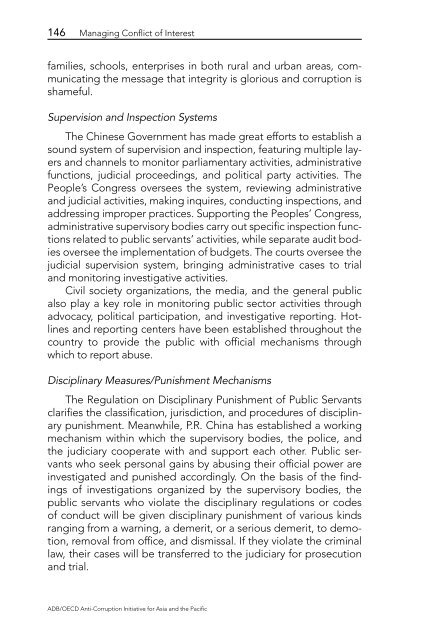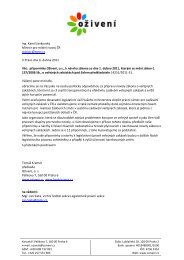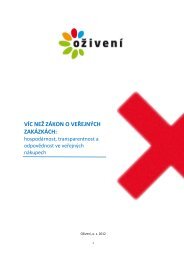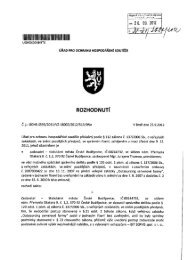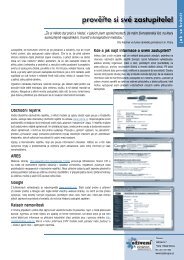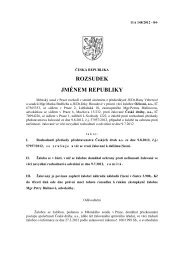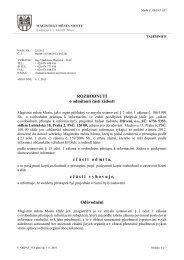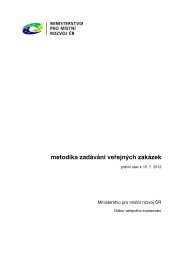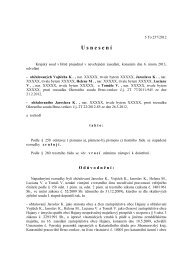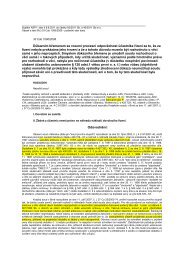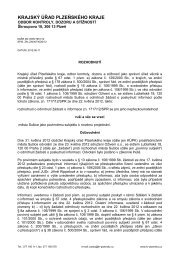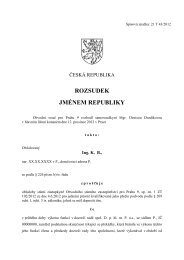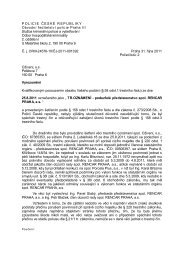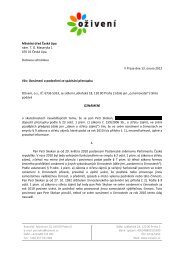Managing Conflict of Interest - Organisation for Economic Co ...
Managing Conflict of Interest - Organisation for Economic Co ...
Managing Conflict of Interest - Organisation for Economic Co ...
You also want an ePaper? Increase the reach of your titles
YUMPU automatically turns print PDFs into web optimized ePapers that Google loves.
146 <strong>Managing</strong> <strong><strong>Co</strong>nflict</strong> <strong>of</strong> <strong>Interest</strong>families, schools, enterprises in both rural and urban areas, communicatingthe message that integrity is glorious and corruption isshameful.Supervision and Inspection SystemsThe Chinese Government has made great ef<strong>for</strong>ts to establish asound system <strong>of</strong> supervision and inspection, featuring multiple layersand channels to monitor parliamentary activities, administrativefunctions, judicial proceedings, and political party activities. ThePeople’s <strong>Co</strong>ngress oversees the system, reviewing administrativeand judicial activities, making inquires, conducting inspections, andaddressing improper practices. Supporting the Peoples’ <strong>Co</strong>ngress,administrative supervisory bodies carry out specific inspection functionsrelated to public servants’ activities, while separate audit bodiesoversee the implementation <strong>of</strong> budgets. The courts oversee thejudicial supervision system, bringing administrative cases to trialand monitoring investigative activities.Civil society organizations, the media, and the general publicalso play a key role in monitoring public sector activities throughadvocacy, political participation, and investigative reporting. Hotlinesand reporting centers have been established throughout thecountry to provide the public with <strong>of</strong>ficial mechanisms throughwhich to report abuse.Disciplinary Measures/Punishment MechanismsThe Regulation on Disciplinary Punishment <strong>of</strong> Public Servantsclarifies the classification, jurisdiction, and procedures <strong>of</strong> disciplinarypunishment. Meanwhile, P.R. China has established a workingmechanism within which the supervisory bodies, the police, andthe judiciary cooperate with and support each other. Public servantswho seek personal gains by abusing their <strong>of</strong>ficial power areinvestigated and punished accordingly. On the basis <strong>of</strong> the findings<strong>of</strong> investigations organized by the supervisory bodies, thepublic servants who violate the disciplinary regulations or codes<strong>of</strong> conduct will be given disciplinary punishment <strong>of</strong> various kindsranging from a warning, a demerit, or a serious demerit, to demotion,removal from <strong>of</strong>fice, and dismissal. If they violate the criminallaw, their cases will be transferred to the judiciary <strong>for</strong> prosecutionand trial.ADB/OECD Anti-<strong>Co</strong>rruption Initiative <strong>for</strong> Asia and the Pacific


